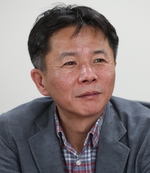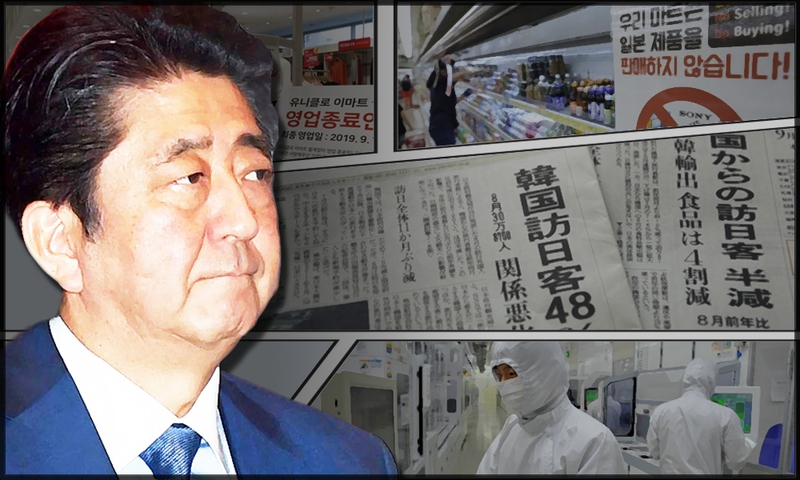Posted on : Oct.10,2019 16:28 KST
Country’s conservative press claimed controls would lead to total economic disaster
Oct. 11 will mark the 100th day since the Japanese government tightened regulations on exports to South Korea. When Japanese Prime Minister Shinzo Abe announced he was imposing export controls on South Korea in early July, the coverage by South Korea’s conservative newspapers suggested that the economy was going to collapse. They claimed that semiconductor factories were going to shut down within a month and that the damage to South Korean companies would exceed that of Japanese companies by more than 300-fold. They also said the Abe government would follow up on its export controls with financial retribution that would trigger a disaster on the scale of the 1997 Asian Financial Crisis.
But 100 days have now passed without anything of the sort happening. In fact, we’re seeing the exact opposite.
So far, there hasn’t been a single report of a South Korean company being directly harmed by the Abe administration’s export controls. Of course, there’s still a lot of uncertainty, and there’s no telling what Abe may have up his sleeve. We’ve got to stay vigilant and be prepared for anything.
The export controls have also brought unexpected benefits. The South Korean government and corporations have woken up to the risks attendant upon excessive dependence on other countries in the parts, materials, and equipment industry. This has served as an opportunity for identifying and rectifying the problematic aspects of previous policies. A more harmonious and cooperative relationship is forming between South Korea’s chaebol conglomerates and their smaller suppliers. There is news of successful attempts to move production of semiconductor materials onshore.
Japanese companies seeing more damage than S. Korean companies
In contrast, the Abe administration has provoked major complaints from Japanese companies because its trade retribution came in the form of export controls, rather than import controls. During the months of July and August, Japan’s exports to South Korea declined 8.1% relative to the same period last year. That’s more than double the 3.5% decline in South Korea’s exports to Japan. In effect, Japan has fallen afoul of its own scheming. Japanese manufacturers are dodging the export controls by rerouting products through other countries — a desperate measure aimed at maintaining relationships with the South Korean companies that are their main clients.
The Abe administration’s export controls triggered the rage of the Korean public and ignited a boycott of Japanese products that has battered affected industries in Japan. The damage has been particularly severe in the area of tourism. Statistics collected by the Japan National Tourism Organization show that the number of South Korean tourist visits to Japan was down 7.6% in July and 48% in August from the same periods last year. This story ran on the front page of Japan’s major newspapers on Sept. 19, when the statistics for August were released, suggesting that the news came as a major shock. Japanese automobiles, a symbol of Japan’s manufacturing prowess, saw sales in South Korea drop by 60% in September. Over the past year, Japan’s share of South Korea’s import car market has fallen from 15.9% to 5.5%. And in September, just US$6,000 worth of Japanese beer was imported to the country, a decrease of 99.9%. Imports of Japanese beer have basically been halted.
Abe’s miscalculation that S. Korea would immediately raise white flaga
Why is the situation unfolding in this manner? It turns out that the Abe administration made several miscalculations.
When the Abe administration announced its export controls, pundits said that the announcement followed a long process of painstaking preparation. In retrospect, however, that assessment appears to have been inflated. The Abe administration had hoped to use trade as a cudgel to simultaneously solve issues in domestic politics and foreign policy, backed by anti-Korean sentiment in Japan. That turned out to be a blunder. Abe appears to have believed that interrupting exports of semiconductor materials would force South Korea to raise the white flag. Abe was apparently working with incorrect data, and the plan went awry from the first step.
It’s extremely rare to conduct trade retribution through export controls, rather than import controls. Restrictions on imports, such as tariffs and the exchange rate, are at the heart of the trade dispute between the US and China, too. Nevertheless, the Abe administration bizarrely chose to push through export controls, even though such measures are liable to not only damage the targeted country but also the global supply chain. Interrupting South Korea’s production of semiconductors would throw the global electronics industry into disarray. That’s why major media in the US and Europe warned the Abe administration to back away from a hopeless trade war.
Second, the Abe administration underestimated South Korea. While it’s true that Japan has a stronger economy, the South Korean economy has also grown swiftly. South Korea is no longer easy for Japan to push around.
Third, the firm but mature response by the South Korean public far exceeded the expectations of the Abe administration. At the boycott’s initial phase, officials in the Abe administration pooh-poohed it, assuming it wouldn’t last for long. Little did they know that it would spread so far, unlikely previous campaigns.
In the end, reconciliation is best for both countries
Even so, it’s not desirable for South Korea-Japan relations to remain like this. The two countries have maintained a win-win relationship based on cooperation and division of labor that takes advantage of their geographical proximity. Deteriorating bilateral relations is a loss for both countries. Not only conscientious NGOs but also conservative politicians in Japan are saying that Japan needs to get along with South Korea.
 |
|
Ahn Jae-seung, editorial writer
|
Two potential turning points are coming up: the enthronement ceremony of Japanese Emperor Naruhito on Oct. 22 and the termination of the two countries’ GSOMIA intelligence-sharing agreement on Nov. 22. This is an opportunity for the South Korean government to use its leverage. It’s time to apply our diplomatic negotiating skills while sticking to our principles.
By Ahn Jae-seung, editorial writer
Please direct comments or questions to [english@hani.co.kr]










